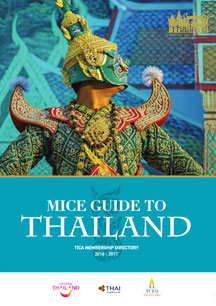
ASEAN
HOW THAILAND COULD BECOME SOUTHEAST ASIA'S NEXT FINTECH HUB
When people think of Thailand, they associate the Kingdom with a lot of things: Beaches, backpackers, temples, elephants, enlightenment. In short, all of
the elements that draw millions of tourists to the Southeast Asian nation each year. But members of Thailand’s fintech community see the country as a
place ripe with opportunity for making its mark on the regional--and global--startup scenes as well.
Omise, a payment management platform founded by Jun Hasegawa and Ezra Don Harinsut, is Thai fintech’s greatest success story to date. In 2016,
it raised a $17.5 million Series B round and currently operates in Thailand, Japan, Indonesia and Singapore. It’s an aspirational story that is indicative
of the possibilities for other fintech startups in Thailand, given the right conditions.
“Fintech startups have the potential [to] stimulate innovation across not just the Thai financial services industry, but across other adjacent industries
such as commerce, healthcare, and even education," said Paul Ark, managing director at VC firm Digital Ventures and a Seedstars ambassador.
Ark said that increased adoption of blockchain technologies, Big Data and artificial intelligence would enable Thai fintechs not only to enhance
the products and services available to existing customers, but to serve the country’s under- and unbanked consumers as well.
Akaradej Disyadej, managing director of the Thai Fintech Association, said he believes the Thai fintech sector is strong, and that it’s capable of
competing with its ASEAN neighbors and other markets. “We believe that all of these people are very smart,” Disyadej said. “We aim to engage
them and [help] them do fintech business in Thailand, and we also want to promote them out. We want to help them into the global market.” But
the association aims to provide assistance to businesses at all levels. “We believe that if we would be able to incubate or groom just one fintech
company, it will help the economy by producing revenue for that SME,” Disyadej said.
From Thailand to ASEAN -- and the world
The Thai Fintech Association formed in 2016 as a networking club that would facilitate connections among fintech startups, big banks and investors, according
to Disyadej. But the organisation filed as an association with the Ministry of the Interior this year so it could take a more hands-on role in the industry’s
development. Disyadej said the Thai Fintech Association is working to establish a national fintech sandbox for startups, through which they can conduct
product testing, meet with potential partners and obtain funding. He added that the organisation is hoping to secure a government grant worth 29 million
baht (approximately $850,000 USD) to use toward these efforts.
The theme of regional expansion and viability comes up often in conversations about Thailand’s fintech opportunities. TechGrind, an organisation
striving to create the next Silicon Valley in Southeast Asia, sees Thailand as an advantageous hub for its companies. Although TechGrind operates in
six countries in the region, it has relocated several of its startups to Bangkok so they can make use of TechGrind’s network and resources there. But
TechGrind approaches opportunities in fintech -- and in all startup sectors -- from a cross-border perspective.
TechGrind only invests in companies with products and services that will be competitive regionally. “One country is too insignificant,” said Efraim Pettersson
Ivener, a founding partner at TechGrind. “All of our startups are regional, if not global, in scope and agenda.”
“Even if there’s a great fintech startup in Thailand, if they aren’t doing something regional, they’re going to be obsolete in two to three years. And that’s
being generous,” Ivener said. “A big problem in any space is going to be solved eventually by a startup, and a startup that has an international business
ability, and is able to go regional in Southeast Asia at least, from the get-go is going to basically wipe out everybody else.”
But the ability to go global doesn’t mean creating variations of what other major tech companies have already achieved. Ivener said TechGrind invests in
companies that solve problems unique to developing countries. One such company is Pymlo, which creates accounting software for small businesses in
Thailand and the broader region. Upon discovering that many businesses in Thailand and throughout ASEAN manage their accounting by hand or using
Excel spreadsheets, Pymlo co-founders Kyle McComb and Kaniz Lin saw an opportunity.
“We seek to solve a serious problem that a lot of Southeast Asian businesses have -- the lack of an easy and localized accounting solution for their
businesses’ needs,” McComb said via email. Pymlo aims to serve companies all along the spectrum, from one-person startups to international
businesses. The all-in-one solution is designed to accommodate business owners across ASEAN borders, including those who want to do business
regionally.
“As ASEAN becomes more and more integrated, SEA SMEs are finding doing business regionally to be easier, as well as finding it to be more lucrative,”
McComb said. “However, a lot of these businesses do not understand much about accounting regulations and laws within their country, let alone another
country’s regulations. SEA SME’s need a solution that can solve more than just domestic accounting goals, but also regionally, and need a product that is
localized for each region.” To accommodate that need, Pymlo offers more than 150 currency options and multi-language support.
The challenges are real, but so is the optimism
McComb said Thailand makes sense as a base for Pymlo because of the entrepreneurial climate. However, he noted that tax laws and regulations in different
markets can be challenging to navigate. “Regulations throughout the region vary to being incredibly friendly to being incredibly nativist,” he said.
In Thailand specifically, opinions on regulations are mixed, though many wish to see more clarity from the government. “As consumer behaviors shift,
technology experts will come up with new solutions to meet consumer’s demands. To keep business gateway open, it is essential that regulators and
policy makers catch up with technological changes,” said Somchai Lertsutiwong, Chief Executive Officer of the Thai mobile phone operator AIS. The corporation
also runs AIS The Startup Connect, which provides business support to Thai startups.
Disyadej said he is particularly concerned about the government issuing regulations with regard to crowdfunding and peer-to-peer lending platforms.
A lack of clarity is preventing some from moving forward with their ideas, and he fears they will lapse if they are not able to move forward soon.
But Ivener takes a more optimistic view. He said that the lack of clear regulations affords startups freedom to quickly launch and test their products. Rather than
jump through regulatory hurdles before proving their concepts, he said companies can iterate more easily without strict standards in place.
However, he noted that significant challenges remain for Southeast Asia’s nascent startup community. Raising capital is one of them. Ivener said TechGrind
has sent its startups to the four major investment firms in SEA to seek co-investors, but to no avail. “I’ve yet to see a single Southeast Asian investment house
ask quality startup due diligence questions,” Ivener said. “Pretty much the only thing they know how to ask is, “Show me your revenue.” Because they’re
most familiar with industries like retail and real estate, they’re accustomed to focusing on revenue instead of growth potential, a key factor in evaluating
tech investments, Ivener said. But he remains optimistic that TechGrind will eventually be able to do a deal with some of these firms as the space matures.
The investment situation may be aided by the formation of corporate VC funds during the past year, according to Ark. These will “be a major boost to the
Thai fintech and financial services industry, as banks will be investing in both local startups as well as identifying leading technologies around the world
to be implemented at home.
Ivener said finding founder-level talent can also be difficult, again given how new the ecosystem is. “That’s a massive, massive problem in the startup world,
finding people that are experienced enough and skilled enough to be able to take a founder role in a startup,” Ivener said. “That’s why the majority of startups
out there fail or accomplish very little.”
Ark said copycat competitors from larger markets such as China and Singapore pose a threat to Thai fintechs as well, particularly for B2C companies. On
the B2B side, he said startups faced significant pressure to strike partnerships or land deals with “slow-moving, bureaucratic financial institutions” before
running out of money.
Both Lertsutiwong and Disyadej expressed confidence in Thailand’s fintech entrepreneurs, particularly if they are given supportive environments and the
resources needed to grow into regional, and eventually global, players.And with continued efforts from incubators, accelerators, investors and the entrepreneurs
themselves, many of Thailand’s (and Southeast Asia’s) tech startup challenges will fade -- or at least evolve into better problems. TechGrind Asia intends to
see that happen, which is why it’s been creating investment, logistical, and mentorship opportunities across the region.
As Ivener described his organization’s mission, “We built it to try to solve from the bottom all the way up all the problems startups have in Southeast Asia.”




